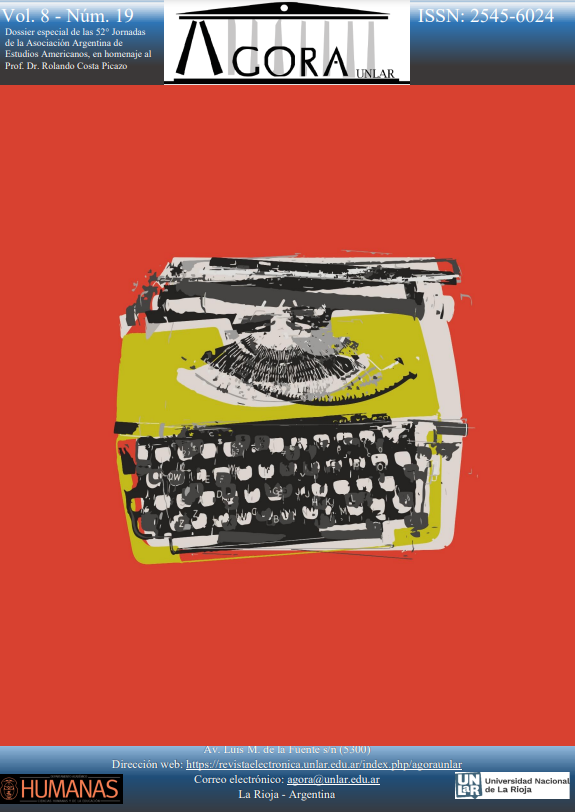Cuellos azules y excesos: el realismo sucio de Bukowski como manifestación del capitalismo tardío
Palabras clave:
realismo sucio, contracultura, capitalismo tardíoResumen
La implementación del fordismo y el fin de la Segunda Guerra Mundial; la lucha de clases y la explotación de una Estados Unidos proletaria precarizada desembocaron en un popurrí de movimientos contraculturales que expresaron el desagrado de la clase obrera ante un futuro cada vez más gris. Es entre beats, hippies y punks que Charles Bukowski emerge en la escena literaria y se establece como figura de relevancia, como anti-héroe maldito. Bukowski fue considerado siempre un artista difícil de abordar: tanto aproximarse a su obra como categorizarla son tareas complejas, por su lenguaje políticamente incorrecto, cargado de vulgarismos y desdén. Nos proponemos un análisis del poema “Dinosauria, We” (“Dinosaurios, nosotros”) (1991), destacado en tanto crítica social, que exhibe claramente las corrientes nihilistas su obra. Buscamos definir los ideales filosóficos y contraculturales detrás de ésta y abrir una discusión sobre las motivaciones trás su uso de lo obsceno. Cabe preguntarse si su empleo de elementos del realismo sucio, como ser un vocabulario corriente y temáticas como el alcohol, el sexo y otros excesos, constituye una simple excentricidad o la manifestación sintomática de los problemas estructurales que el sistema implica en una clase obrera agotada e impotente. Para ello, utilizaremos las nociones planteadas por el crítico inglés Mark Fisher (2012) sobre la “tristeza hedonista” (p.168) y el carácter sistemático y estructural de los problemas de salud mental, fruto del capitalismo tardío; lo que nos será útil para reformular las motivaciones tras el estilo del autor. Blue collars and excesses: Bukowski’s dirty realism as the manifestation of late-stage capitalismAbstractAlong with the implementation of Fordism and the end of World War II, the class struggle and exploitation of a precarized proletarian America led to a miscellany of countercultural movements, which aimed to express the discontent of the working class before the prospect of a future that only got greyer. It is among beats, hippies and punks that Charles Bukoski emerges in the literary scene and solidifies as a relevant figure, as a damned anti-hero. Bukowski was always considered a problematic artist: approaching his works and categorizing it are both difficult tasks, because of his politically incorrect language, loaded with vulgarisms and disdain. We propose an analysis of the poem “Dinosauria, We” (1991), relevant for its explicit social critique; as it exhibits the nihilistic tendencies embodied in his work. We aim to define the philosophical and countercultural ideals behind it, and to open up a discussion about the true motivations behind his use of the obscene. One may ask whether his use of elements of dirty realism, such as common language and themes of alcohol, sex and other excesses, are simply an excentricity or the symptomatic manifestation of the structural issues that the socioeconomic system implicates for a weary and impotent working class. To achieve our purpose, we will use notions posed by English critic Mark Fisher (2012), those of “hedonistic sadness” (p.168) and the structural and systemic nature of mental health issues resulting of late stage capitalism; which will be useful in the task of reformulating the motives behind the author’s particular style.Keywords: dirty realism - counterculture - late stage capitalismDescargas
Publicado
21-09-2023
Número
Sección
ARTÍCULOS DE INVESTIGACIÓN O REVISIÓN TEÓRICA





